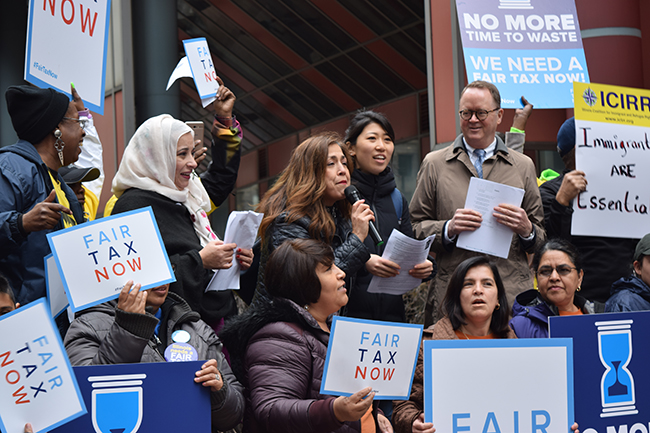Our tax code is both a symptom of and instrument of systemic racism – and, in short, it can be fundamentally unfair.
July 27, 2020

Our tax code is both a symptom of and instrument of systemic racism – and, in short, it can be fundamentally unfair.
In Illinois, the Shriver Center’s home base, low-income and working people now pay twice as much as wealthy people as a share of their income. This November, we have an important opportunity to change that. The “fair tax” constitutional amendment would change our state’s income tax structure from a flat tax, where everyone pays the same percentage of their income, to a graduated rate tax, where most people would pay the same amount or less in taxes while the wealthiest state residents, particularly those at the very top of the income scale, would pay more.
This fair tax system is actually the norm across most of the United States – it’s exactly how the federal tax system and the tax systems of more than 30 other states work.
The Shriver Center strongly supports a fair tax and urges all Illinois voters to support it at the polls in November. Our view comes straight from our vision – a nation free from poverty, with justice, equality, and opportunity for all. We have long believed that this vision can only be achieved in Illinois if our state has sufficient funding to provide affordable housing for all who need it, ensure that everyone has high-quality healthcare, mandate that workers are well paid and protected from safety hazards on the job, and support Black and Latinx communities from a dehumanizing criminal legal system.
Instead of meeting that vision, Illinois models inequity. Chicago is a microcosm of this problem – so much so that Chicagoans living in a wealthy white neighborhood just north of downtown have a life expectancy of close to 90, while residents of a Black community no more than 3 miles away have a life expectancy closer to 60. This is no accident, but rather the result of deliberate policy choices made over more than 100 years.
Right now, Illinois’ state government does not have the stable year-over-year funding to ensure equity in our policies and investments. We saw this most dramatically during the recent state budget crisis, when the state could not pass a budget for two years, resulting in an expectation that human services providers assist Illinoisans without being paid for their work. During these difficult times, the burden fell most heavily on Black and Brown communities.
Even over the last two years, when lawmakers have made modest investments in equity for the lowest income people in our state, they have only been able to do so by borrowing from the federal government and over-taxing the people they seek to help (particularly Black and Latinx communities) through income, sales, and property taxes, along with fines and fees. The fair tax would eliminate the annual search for risky and harmful revenue sources and raise about $3 billion a year to support our critical priorities.
As we face dual pandemics – COVID-19 and systemic racism – passing the fair tax is even more urgent.
COVID-19 has further exposed inequities that already existed – Black and Latinx people are dying at disproportionately high rates, often as a result of being forced to keep working in unsafe conditions because they have been deemed “essential” workers – without getting employer and government support to stay safe. And Black unemployment has risen substantially, continuing to far exceed unemployment for white people. Illinois needs additional funding to support these communities through healthcare access, public supports, and workforce development.
And recent murders of Black people at the hands of unchecked police violence expose the reality that systemic racism has never disappeared. Police and other government agencies destroy and devalue Black lives on a daily basis. Black communities want and deserve access to good paying jobs, health insurance at a reasonable cost, government supports when they are needed, affordable housing, and reform to the punitive criminal-legal and child welfare systems that over-incarcerate Black people and cruelly separate Black families. To support these efforts, we join many others in looking at a divest / invest model, where jail and police funding is decreased, and the money saved is put into services at the community level. But these investments and the funding needed are greater than divestment from the carceral state would generate alone. Fair tax revenue would provide additional funding for these services, and move our state closer to racial justice.
Together, we can pass this critical reform in November. Join the Shriver Center in supporting the Fair Tax Amendment and pledge to Vote Yes for Fair Tax.
Fiscal policies should ensure that all communities can thrive.